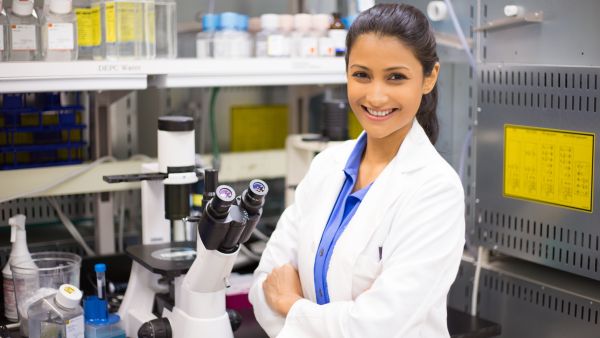While many of the countries in the Arab World rank amongst the lowest in terms of gender equality and opportunities available for women, there is a really long list of outstanding female scientists who have successfully achieved international recognition and respect.
Without more #WomenInScience, the world will continue to be designed by and for men, and the potential of girls and women will remain untapped.
— António Guterres (@antonioguterres) February 11, 2021
We must ensure that girls have access to education and that they can see a future for themselves in science & tech. pic.twitter.com/kJq8SaLKaC
It is one thing to make it in an environment that provides you with all the tools you need for success, and a whole other thing to achieve success in a highly challenging one, whether in terms of resources, opportunities, or even cultural and social stigmas and traditional gender roles.
All over the world, the scientific field continues to be heavily male-dominated, creating extra challenges for women who are passionate about the different sciences. Meanwhile, in the Arab World, things get a little extra challenging, not only because of the relatively higher regard for traditional gender roles, but also because of the general scarcity for appreciation and availability of resources available for scientists.
Celebrating International Day of Women and Girls in Science this year, we have chosen to highlight a number of Arab women scientists who have, despite all odds, excelled in their respective fields, achieved great success, and gained recognition for their work.
1. Dr. Lama AlAbdi (Saudi Arabia)
Honored last December as one of six women scientists in the Middle East who are engaged in breakthrough research, Dr. AlAbdi's work as a biochemist has been mainly concerned with the connection between gene expression and the development of non-genetic diseases.
2. Dr. Abeer Al Bawab (Jordan)
Despite battling kidney cancer for the last three years, Dr. Abeer Al Bawab, a professor of chemistry at the University of Jordan has successfully excelled through her research in physical chemistry, receiving several international awards, including the prestigious IUPAC 2021 Distinguished Women in Chemistry or Chemical Engineering award.
3. Ayah Bdeir (Lebanon)
Supported by her family, Ayah's love for science and entrepreneurship has been focused on educational robotics, as she has founded littleBits in 2011 hoping to create an open-source library of modular electronics.
4. Dr. Nour Al-Sabeeh (Kuwait)
As an assistant professor at the Physiology Department at Kuwait University, Dr. Al-Sabeeh has received the L’Oreal-UNESCO Middle East Fellowship in 2019, in recognition of her research focusing on the different mechanisms underlying the development of type 2 diabetes.
We are proud of Dr. Nour Al-Sabeeh, Assistant Professor in the Physiology Department at Kuwait University, for receiving the 2019 L’Oreal-UNESCO Middle East Fellowship. pic.twitter.com/STCdshcHDb
— KFAS (@kfasinfo) November 26, 2019
5. Dr. Samia Elfekih (Tunisia)
Focused on climate change, food security, and global human health, Dr. Elfekih has dedicated her life to studying and exploring the different ways through which humanity could utilize eco-friendly strategies to achieve better environmental balance.
6. Dr. Maryam Al Yammahi (UAE)
Featured for her work during the sixth edition of L’Oréal-UNESCO for Women in Science Middle East Fellowship in 2019, Dr. Al Yammahi's research is mainly concentrating on data science, big data, and artificial intelligence as main drivers of the decision-making process in every field. She is the Assistant Dean for Students at College of IT UAE University.
Lately, the UAE has celebrated its first Mars exploration mission called Hope, one that has been prepared for by a science team 80% of which are women.
Not only has the Hope Mars mission been accomplished mostly by women, but the whole mission has been supervised by a woman scientist, the Emirati Minister of State for Advanced Sciences Sarah Al-Amirim, who has also been named the chair of the UAE Space Agency and the United Arab Emirates Council of Scientists, and Deputy Project Manager of the Emirates Mars Mission.
What is the most challenging issue facing women in science in this day and time? Where do you think are women's experiences in the scientific fields relatively easier?







